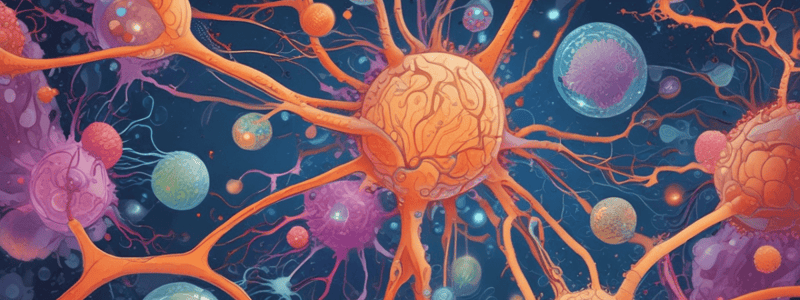Podcast
Questions and Answers
What is the primary difference between innate immunity and adaptive immunity?
What is the primary difference between innate immunity and adaptive immunity?
- Innate immunity is faster, whereas adaptive immunity is slower
- Innate immunity involves only B cells, whereas adaptive immunity involves T cells
- Innate immunity has no memory, whereas adaptive immunity has memory (correct)
- Innate immunity is specific to certain microbes, whereas adaptive immunity is non-specific
What is the name of the disorder that David Phillip Vetter was born with?
What is the name of the disorder that David Phillip Vetter was born with?
- Immunoglobulin Deficiency Disorder
- Autoimmune Disorder
- Acquired Immune Deficiency Syndrome (AIDS)
- Severe Combined Immune Deficiency (SCID) (correct)
What is the function of effector T cells in adaptive immunity?
What is the function of effector T cells in adaptive immunity?
- To act as a barrier against infection
- To recognize and bind to specific antigens
- To produce and secrete antibodies
- To directly kill infected cells or produce chemical signals that activate other immune responses (correct)
What is the result of not having adaptive immunity?
What is the result of not having adaptive immunity?
What is the role of B lymphocytes in adaptive immunity?
What is the role of B lymphocytes in adaptive immunity?
What is the term for the process by which the specificity of antibodies is refined after meeting an antigen?
What is the term for the process by which the specificity of antibodies is refined after meeting an antigen?
What is the main limitation of using mouse monoclonal antibodies as therapeutics?
What is the main limitation of using mouse monoclonal antibodies as therapeutics?
What is the characteristic feature of chimeric antibodies?
What is the characteristic feature of chimeric antibodies?
What is the function of Rituximab?
What is the function of Rituximab?
What is the characteristic feature of humanised antibodies?
What is the characteristic feature of humanised antibodies?
What is the function of Omalizumab?
What is the function of Omalizumab?
What is the characteristic feature of fully human monoclonal antibodies?
What is the characteristic feature of fully human monoclonal antibodies?
What is the function of Adalimumab?
What is the function of Adalimumab?
What is the significance of the ending –ximab in monoclonal antibodies?
What is the significance of the ending –ximab in monoclonal antibodies?
What is the main benefit of the constant migration of lymphocytes throughout the body?
What is the main benefit of the constant migration of lymphocytes throughout the body?
How does the adaptive immune system generate a diverse repertoire of antigen receptors?
How does the adaptive immune system generate a diverse repertoire of antigen receptors?
Which statement best describes the difference between the primary and secondary immune response?
Which statement best describes the difference between the primary and secondary immune response?
What is the role of memory cells in the adaptive immune response?
What is the role of memory cells in the adaptive immune response?
Which of the following is a characteristic of adaptive immunity but NOT innate immunity?
Which of the following is a characteristic of adaptive immunity but NOT innate immunity?
How does the adaptive immune system overcome the vast diversity of microbes, including their ability to mutate?
How does the adaptive immune system overcome the vast diversity of microbes, including their ability to mutate?
Which of the following is NOT a component of adaptive immunity?
Which of the following is NOT a component of adaptive immunity?
Which of the following statements is TRUE regarding T cell receptors and B cell receptors?
Which of the following statements is TRUE regarding T cell receptors and B cell receptors?
Which of the following statements about T cell receptor activation is TRUE?
Which of the following statements about T cell receptor activation is TRUE?
What is the primary function of the constant region of the heavy chain in an antibody?
What is the primary function of the constant region of the heavy chain in an antibody?
How does junctional diversity contribute to the diversity of antibodies?
How does junctional diversity contribute to the diversity of antibodies?
Which of the following is NOT a characteristic of B cell development?
Which of the following is NOT a characteristic of B cell development?
What is the role of the variable regions in an antibody molecule?
What is the role of the variable regions in an antibody molecule?
Which of the following correctly describes the function of helper T cells?
Which of the following correctly describes the function of helper T cells?
Which of the following statements regarding the diversity of antibodies is TRUE?
Which of the following statements regarding the diversity of antibodies is TRUE?
What is the main difference between B cell and T cell activation?
What is the main difference between B cell and T cell activation?
Which antibody class is primarily responsible for neutralizing toxins and viruses by blocking their interaction with other cells?
Which antibody class is primarily responsible for neutralizing toxins and viruses by blocking their interaction with other cells?
What are the subclasses of IgG?
What are the subclasses of IgG?
What is the primary function of Fc receptors found on cells like macrophages?
What is the primary function of Fc receptors found on cells like macrophages?
What is one role of antibodies in activating the complement cascade?
What is one role of antibodies in activating the complement cascade?
Which antibody isotype is generally measured in serum to assess specific immune response following vaccination?
Which antibody isotype is generally measured in serum to assess specific immune response following vaccination?
Which of the following antibody functions involves agglutinating particles like pathogen debris?
Which of the following antibody functions involves agglutinating particles like pathogen debris?
What defines the different classes or isotypes of antibodies?
What defines the different classes or isotypes of antibodies?
What is a key characteristic of the IgM antibody isotype?
What is a key characteristic of the IgM antibody isotype?
Study Notes
Adaptive Immunity
- Adaptive immunity is slower than innate immunity but provides specific and long-lasting protection
- It requires lymphocytes, and without them, the body cannot fight infections (example: David Phillip Vetter, "The Boy in the Bubble")
- Adaptive immunity depends on cells that recognize unique antigenic shapes and have specific receptors
Lymphocyte Receptors
- T cell receptor is a heterodimer with one binding site for antigen, composed of alpha and beta chains
- B cell receptor is an antibody with two antigen binding sites, composed of two identical heavy chains and two identical light chains
- Lymphocyte receptors have diverse specificities due to gene rearrangement, which increases the probability of encountering specific antigens
Diversity of Lymphocyte Receptors
- Gene rearrangement creates the unique specificity of B and T cell receptors
- Total number of human genes in the genome is approximately 25,000, but microbe diversity exceeds millions, and they can mutate and adapt
- Junctional diversity adds further diversity to B and T cell receptors
B Cell Receptor and Antibody
- B cell receptor and antibody have different consequences when binding to T cells or B cells
- Antibody = Immunoglobulin, composed of two identical heavy chains and two identical light chains, with variable regions determining specificity
- Constant regions of the heavy chain determine the function of the antibody (IgM, IgG, IgA, IgE, or IgD)
Functions of Antibodies
- Neutralize toxins and viruses by binding to them
- Opsonize pathogens to promote phagocytosis and killing activity
- Activate the complement cascade to help kill pathogens
- Agglutinate particles (pathogen debris, viruses, etc.)
Functions of Different Antibody Isotypes
- IgG: main serum antibody, good at opsonization, and used in vaccine responses
- Monoclonal antibodies: can be chimeric, humanized, or fully human, used to target specific cells or molecules (e.g., Rituximab, Omalizumab, Adalimumab)
Studying That Suits You
Use AI to generate personalized quizzes and flashcards to suit your learning preferences.
Related Documents
Description
Learn about B cells, antibodies, and lymphocyte receptors in the context of adaptive immunity. Understand the role of B lymphocytes and T lymphocytes in the immune response.




